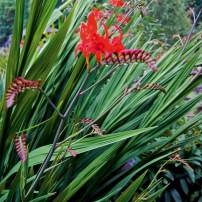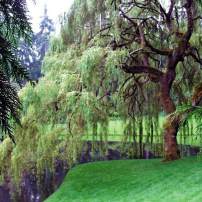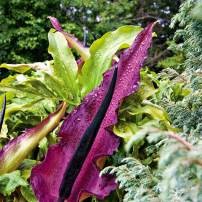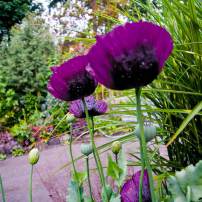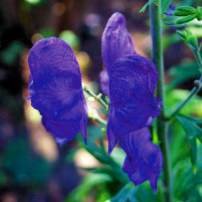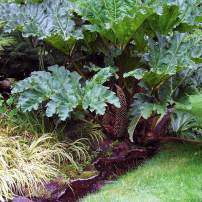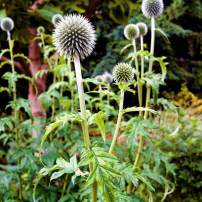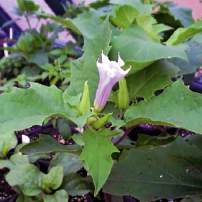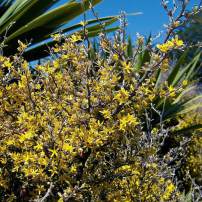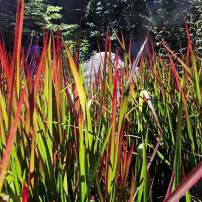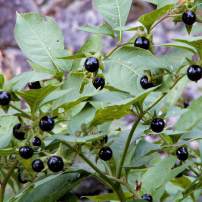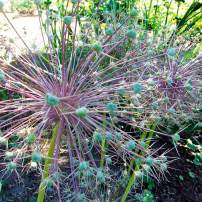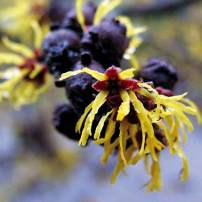 Welcome to my garden. Open the gate and step in, but mind the brambles and thorns. Careful to not crush the bleeding heart. Don’t bump the spiny eccentricity of the Solanum pyracanthum unless you like a good blood-letting.
Welcome to my garden. Open the gate and step in, but mind the brambles and thorns. Careful to not crush the bleeding heart. Don’t bump the spiny eccentricity of the Solanum pyracanthum unless you like a good blood-letting.
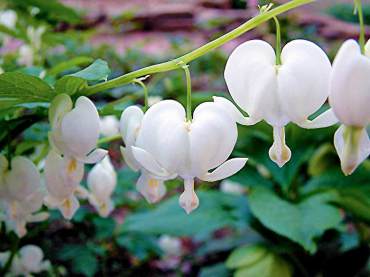
A great garden plant for partially shady sites on the Kitsap Peninsula. Varieties include a white-flowered form and the excellent, chartreuse-foliaged “Gold Heart.”
And watch the vines; they sneak up on you in this murky light. I suppose I should exert a bit of control over these beautiful savages but they seem to have a mind of their own. The beds run amok and good help is hard to find.
You’re a gardener, aren’t you? It’s so nice to entertain someone who appreciates things that bloom and grow. Of course, death and decay are equally important in a garden, don’t you agree? Consider these white calla lilies (so lovely atop a casket); how could we admire their pale perfection if not for their fleeting existence? In the garden, beauty requires sacrifice. Would the weeping willow be as lovely if its leaves did not fall like tears each autumn to bare its naked soul to the icy heart of winter?
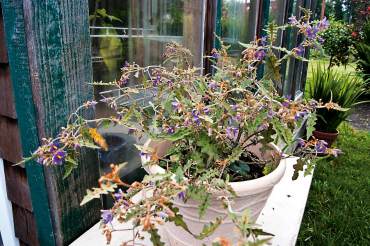
and Solanum quitoense, bed-of-nails
Not hardy in the Northwest, these colorful, wickedly prickly novelties never fail to attract attention in a summer container. Can be overwintered in the house or greenhouse.
Here now, have a cup of tea. I brewed it from my own herbs. As you sip, we will go in search of my Dracunculus vulgaris. You may know it as voodoo lily. No, that’s not a corpse you smell — at least, I think not. The voodoo lily’s lascivious, liver-purple spathe and spadix attract pollinating flies with the perfume of death. Don’t let its malodorous esters interfere with your enjoyment of the tea.
I don’t have many visitors, you know. Ridiculous rumors. Unfortunate tales of grimoires and gris-gris and other gossip of the simple-minded. But let’s talk of you. You’re new in town. No family, you say? A pity. I’m sure you will find a home here: a place you can stay forever.
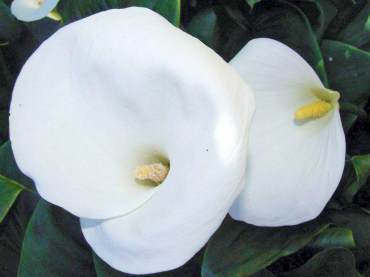
A reliable garden staple that thrives in damp soil. In the Pacific Northwest, grow them in part shade or, if the ground stays moist year-round, full sun.
Now let me introduce you to “Lucifer.” Crocosmia “Lucifer,” to be precise. Its unrepentantly red blooms smolder like the embers of incendiary insanity, don’t you agree? I’m afraid it’s engaged in a duel to the death with the spiky bludgeons of globe thistle, Echinops ritro. It is a contest the plants themselves will decide; in the garden, it’s a mistake to pretend that we are the ones in charge.
What? Voices, you say? No, no. That’s just the wind in the branches. Take care as you pass the Gunnera manicata. Something has been taking bites big as washtubs from the leaves. Yes, how clever of you; it is known as “dinosaur food.” Farther down the path lurks the impenetrable Eryngium giganteum “Miss Willmott’s Ghost.” Her armature may be daunting, but her manners are lovely.
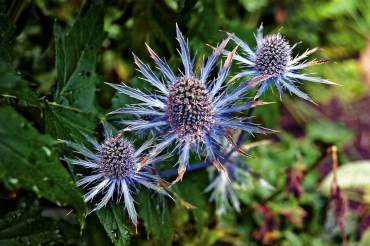
This and other eryngium varieties provide not only texture but the uncommon colors of silvery blue and amethyst to the garden. They take poor, dry soil and full sun to light shade. Some species reseed.
Just past the blood grass and the spidery seed heads of Allium christophii lies the deepest recesses of the garden. This is where I sow the beautiful abominations of monkshood, belladonna, devil’s weed and opium poppy. Mind altering, yes — some deadly — but I find them indispensible in my numinous pursuits. But enough talk. Finish your tea.
An open grave? How fanciful of you! It’s only a hole for a new witch hazel. We like to dig large. Lots of room for the roots, you know. Are you feeling unwell? Have a seat here by the Corokia cotoneaster and relax your mind. Tell me, what do you think of my little garden plot? There’s no need for you to leave now — or ever, in fact. I have a place for you right here. Good help is so hard to find…
More Spooky Plants
This showy summer performer grows to 4 feet in full sun. The glowing scarlet flowers are beloved of hummingbirds. Spreads slowly but deliberately from corms.
Fast-growing weeping willows are the classic pond-side tree. Grow them in full sun with lots of water.
A locally hardy aroid known for its bloom-time stench of rotting meat as well as for its spectacular (some would say obscene) maroon spathes. Though tropical-looking, this plant is easy and rewarding to grow; the infamous smell lasts only briefly on warm, early summer days. Bright shade or full sun. Regular to low water. The plant goes dormant in August after setting cobs of red seed.
Showy, annual opium poppies are commonly grown in cottage gardens. Flowers range from deepest purples to reds, pinks and lavenders in forms from single to fully double. The glaucous foliage and fat seed heads are ornamental as well. Easy to grow in full sun. Opium poppy and belladonna are staples of many spells and potions.
Spikes of blue flowers and the ability to grow in partial shade make monkshood a tempting choice for the garden. However, these plants are not for those with pets who chew (or near-sighted salad gatherers), as they contain an alkaloid that can stop the heart. It is rumored to be an ingredient in witches’ brew.
Growing to 8 feet tall with leaves the size of patio umbrellas, these jaw-dropping plants want space, boggy soil and full sun to light shade. To keep the leaves at maximum size, feed gunnera during the growing season.
Metallic-blue, spherical flowers are long-lasting and attract butterflies. Full sun and dry to moist (but not wet) soil. These well-behaved perennials grow into large clumps, but don’t spread themselves around the garden. Easy to grow. The flowers can be dried.
Delusions and respiratory failure are the result of consuming devil’s weed. Thankfully, its range does not extend to Western Washington. Some species of datura are grown by gardeners as summer annuals for their fragrant, trumpet-shaped flowers. Known as “zombie cucumber” in Haitian voodoo.
Sculptural small shrubs with nearly naked black branches and small, sparse leaves. Iffy to overwinter in Kitsap Peninsula gardens, but good container subjects.
The ruby hues of blood grass deepen as fall arrives. A low-growing grass to 18 inches that spreads by runners. Striking in large swathes, especially when backlit by the sun.
Not a plant to be purposefully planted, deadly nightshade sometimes appears as a weed in Kitsap County gardens. The black berries tempt the occasional unfortunate to ingestion, which leads to hallucinations or death. Used both in medicine and dark magic.
As beautiful in death as in life, these and many other ornamental alliums leave behind persistent seed heads after the purple flowers have faded. Full sun. Dry soil during summer dormancy and a well-drained site or dig-and-store for winter.
Small trees, choice in the Pacific Northwest. Shredded-cheese blossoms in yellows and bronzes appear at the end of winter and last for several weeks. Most varieties are fragrant. They take full sun or partial shade.
This article was first published in the print edition of the WestSound Magazine in the Fall of 2011. Any discrepancies, omissions, or inclusions that seem incorrect are purely due to the age of this article. WestSound Magazine deemed this article useful and beneficial as a contribution to today's readership, and therefore is included in this site's online article archives. If you feel the content of this article is detrimental due to its age, please feel free to contact us to request removal or modification.



